Former Ugandan lawmaker, Winnie Byanyima is set to take the helm of UNAIDS as its new executive director, the agency announced Wednesday.
“I am honored to be joining UNAIDS as the Executive Director at such a critical time in the response to HIV,” Byanyima said in a statement published by UNAIDS announcing the appointment.
“The end of AIDS as a public health threat by 2030 is a goal that is within the world’s reach, but I do not underestimate the scale of the challenge ahead.”
Byanyima was appointed to the post by U.N. Secretary-General António Guterres, following a recommendation by the UNAIDS Committee of Co-sponsoring Organizations, which concluded the months-long selection process.
She was the only woman shortlisted for the UNAIDS leadership position and was chosen over four other candidates: Chris Beyrer, Salim Abdool Karim, Bernard Haufiku, and Sani Aliyu.
Byanyima’s colleagues at Oxfam International expressed their sadness about her imminent departure from the NGO, where she served as executive director since 2013.
“Whilst it is with much regret to us that Winnie is leaving Oxfam, we wish her every success in this new and highly prestigious role as UNAIDS executive director, which was announced today,” said Henrietta Campbell, chair of Oxfam’s board of supervisors, in a statement.
“Ms Byanyima brings a wealth of experience and commitment in harnessing the power of governments, multilateral agencies, the private sector and civil society to end the AIDS epidemic around the world. Ms Byanyima has been the Executive Director of Oxfam International since 2013. Prior to that, she served for seven years as the Director of Gender and Development at the United Nations Development Programme,” UNAIDS noted in their statement.
Ms Byanyima began her career as a champion of marginalized communities and women 30 years ago as a member of parliament in the National Assembly of Uganda. In 2004, she became the Director of Women and Development at the African Union Commission, working on the Protocol on the Rights of Women in Africa, an international human rights instrument that became an important tool for reducing the disproportionate effect of HIV on the lives of women in Africa.
She holds an advanced degree in mechanical engineering (in energy conservation and the environment) from the Cranfield Institute of Technology and an undergraduate degree in aeronautical engineering from the University of Manchester.




